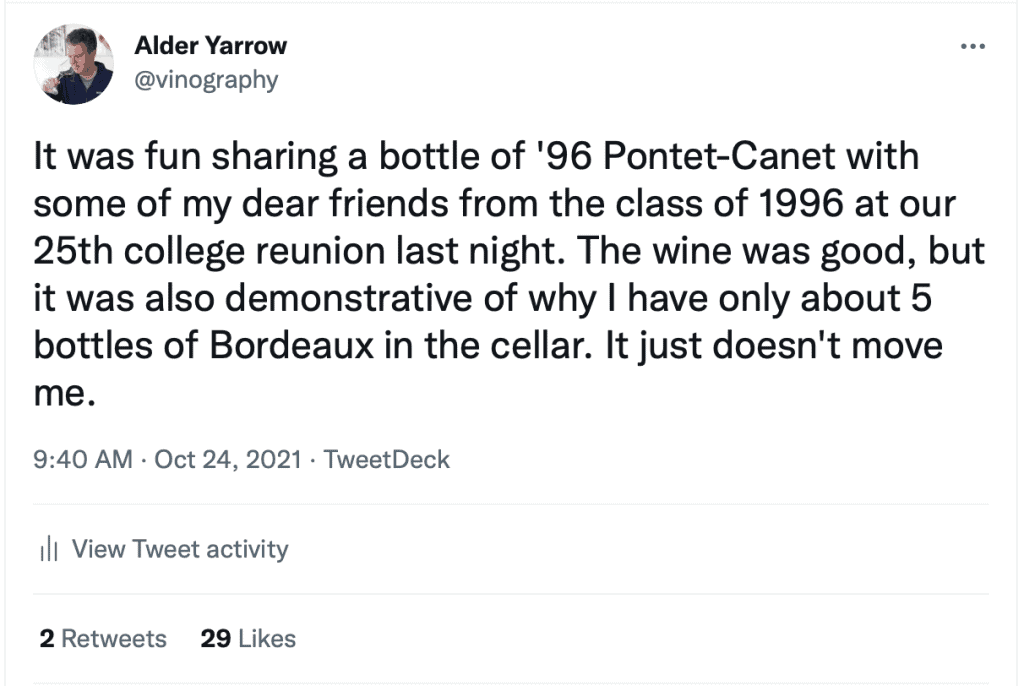This past weekend, I celebrated my 25th college reunion and had a ball reconnecting with old friends and exploring the grounds of my alma mater. For fun, I also brought along some wines to share, including a bottle of 1996 Pontet-Canet, an excellent vintage from the well-respected 5th Growth Bordeaux estate in Pauillac. Since we were the class of 1996, I had a great time sharing the wine (and several other bottles of similar age) with some of my classmates who appreciate such things
The wine itself was very good, full of life, with cedar and forest floor aromas, dried cherries, graphite and leather, and bright citrusy acidity.
But my experience of the wine was like most of my experiences with Bordeaux. It was tasty, but it didn’t truly move me. After a little reflection on that fact overnight, I tweeted as much.

Some people on #winetwitter called the tweet “bold.”
One suggested it was a “profound admission.”
Several others said they resembled that remark.
And the former Executive Editor of a major wine magazine said, “To me, that’s like saying ‘Bach is good but his music doesn’t move me.’ I can accept that it’s true but it makes me a bit sorry for the listener.”
I think that’s the kind of snobbish sentiment that consistently turns people off of wine.
Everyone’s preferences are only the sum total of their individual experiences.
Early on in my wine-drinking life, you could have heard me proclaim loudly to anyone within earshot that I didn’t like Champagne. Turns out, the highest quality Champagne I had tasted up until that point was Veuve Clicquot Yellow Label.
Then one day someone handed me a glass of Krug Grand Cuvee and the whole world of Champagne got an immediate reorganization in my head.
But that’s not what’s going on here.
Just because it’s a great wine, that doesn’t mean people have to like it.
For the record, I’ve tasted most of Bordeaux’s First Growths (Petrus evades me). I had a 2016 Château Mouton Rothschild a couple of weeks ago in a blind tasting (it was pretty good). I regularly attend and taste widely at the Union des Grands Crus de Bordeaux trade tastings when they come through town. There was a time when I regularly attended pre-auction tastings at a local auction house in San Francisco, where I would get to try top Bordeaux wines at 10, 20, 30, 40, and sometimes 50 years of age. I occasionally get samples from Cru Bourgeois producers and review them here on Vinography.
I know what Bordeaux, even great Bordeaux, tastes like, and you know, it just ain’t my bag.
And it shouldn’t have to be just because the establishment says it’s the greatest.
Some Wines are Objectively Better Than Others
To be clear, I don’t believe in subjective relativism when it comes to evaluating wines. Some wines, like some art (and I do include music there), are objectively better than others, because we have a whole historical discourse of critical evaluation that says so.
That discourse exists as part of the cultural conversation and the discipline surrounding the craft and industry of wine, and I willingly participate in it.
But that discourse is largely separate (for most people) from the individual experience of drinking wine, and those of us who are immersed in the discourse all the time are at constant danger of forgetting that.

Gauguin is inarguably one of the great painters. But that doesn’t mean I have to like his paintings. In fact, I don’t. Especially not his Tahitian and Marquesan ones. I don’t respond to them visually, and they give me this icky-white-male-colonialist-gaze vibe that I don’t really care for. I wouldn’t want one hanging on my wall at home.
I can recognize his genius without loving him. Ditto for Jackson Pollock.
Ready for another bombshell? I don’t like Port, either.
I get why people love Port the same way I get that people love Bordeaux. I have experienced the organoleptic qualities of fine aged port, and yes, even marveled at minutes-long finishes and ethereal expressions of vanilla and coffee.
It might be ambrosia to some people, but I can’t get past the raisiny thing.
You Like What You Like
Preference is not the same as critical judgment, and more importantly, it is possible to have your preferences and critical judgment diverge.
Just ask half of the Napa winemakers who make massive 15.2% Cabernets by day and go home to drink Gevrey-Chambertin and Chinon.
Should we feel sorry for them, the same way the aforementioned editor feels sorry for me?
Everyone is allowed to like what they like. They are just not allowed to confuse that preference for a universal truth.
If you’re someone ready to explore the world of wine, remember that while some people might know a sh*t-ton more about wine than you, that doesn’t mean they can decide for you what you like, or judge you for that preference.
And likewise, we critics shouldn’t be allowed to confuse our critical consensus for an imperative of appreciation on the part of others.
Those of us ‘in the business’ should never, ever tell people what they should like when it comes to wine, nor should we condescend to pity them for their preferences, however mundane. Today’s Veuve Clicquot lover is, after all, often tomorrow’s rabid Krug fan.
Our job is to show people the amazing landscape of wine to be explored, and give them whatever help they want along their path of discovery. Where they choose to go, and what parts of the adventure they end up loving should be up to them, not us.
And if you’re someone ready to explore the world of wine, remember that while some people might know a sh*t-ton more about wine than you, that doesn’t mean they can decide for you what you like, or judge you for that preference.
Photo up top by Jean-Luc Benazet on Unsplash